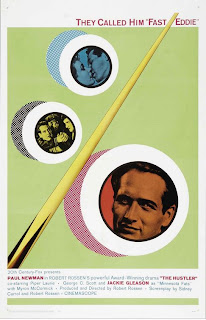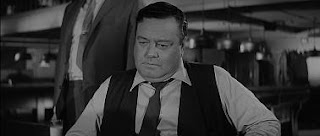Winning, Losing, Wanting to Be Great
 Yesterday I rewatched The Hustler, the 1961 film starring Paul Newman, George C. Scott, Piper Laurie, and Jackie Gleason that many consider to be one of the all-time best gambling films ever made.
Yesterday I rewatched The Hustler, the 1961 film starring Paul Newman, George C. Scott, Piper Laurie, and Jackie Gleason that many consider to be one of the all-time best gambling films ever made. Some even go so far as to consider The Hustler a great poker film, despite the fact that it really contains very little poker at all -- just a couple of incidental shots, really, of a game being played. The central game is pool, of course, and while I can’t say I’ve seen a ton of pool-related films, I imagine The Hustler heads most lists of the best films in which that game is central.
But the movie really does give poker players a lot to think about. In fact, in Total Poker (1977), David Spanier, in his chapter about “Movies,” idiosyncratically promotes the film as “the best film about poker” in his estimation for the way it depicts winning and losing and the struggles and challenges often faced at the tables. The Poker Grump did a nifty job a while back explaining the many “poker lessons” in The Hustler, too. Check out his post here.
It had been a few years since I’d seen The Hustler. Definitely a riveting, well-acted story with a lot of “hard-boiled” elements. And like I say, and as both Spanier and the Grump argue, the “poker” stuff is all there right on the surface. There were a couple of other elements of the film that stood out for me on this viewing, though. Or a couple of characters, rather.
Newman as Fast Eddie, Scott as the slimy Bert Gordon, Myron McCormick as Eddie’s partner, Charlie -- all are certainly great performances and well-wrought characters. But also compelling are Sarah, Eddie’s girl, played by Laurie, and, of course, Minnesota Fats, portrayed by Gleason.
Sarah reminds me a lot of certain troubled female characters populating novels by Jim Thompson, Charles Willeford, and the like. Her ailments, addictions, and neuroses seem to mirror Eddie’s own considerable flaws, a fact which I’m sure many who’ve analyzed the film have pointed out many times over.
Fats, meanwhile, stands in sharp contrast to Eddie, a man utterly confident, comfortable, and content. He represents a figure Eddie wishes he could be but cannot. For Eddie, “the Fat man” is larger than life, a kind of ideal player who has all of the things -- ability, style, and most importantly, character -- Eddie lacks.
But Fats is human, too. He can lose. He’s not really larger than life. We can (I think) “play” like he does, given enough experience and commitment to whatever game it is we choose to play.
 I love Gleason’s look there during the final scene as he listens to Gordon and Eddie arguing with each other over both the money and the meaning of everything that has transpired. Been there. Done that. He’s Phil Ivey enduring a horrendously bad beat at the hands of an amateur. It’s an inspiring image, I think, upon which Eddie -- amid all of the emotions and disturbance of his argument with Gordon -- cannot help but comment before leaving.
I love Gleason’s look there during the final scene as he listens to Gordon and Eddie arguing with each other over both the money and the meaning of everything that has transpired. Been there. Done that. He’s Phil Ivey enduring a horrendously bad beat at the hands of an amateur. It’s an inspiring image, I think, upon which Eddie -- amid all of the emotions and disturbance of his argument with Gordon -- cannot help but comment before leaving.“Fat man,” he says. “You shoot a great game of pool.”
It’s what we all want to do. We want to win, sure. And we don’t like losing. But really, more than anything, we all want to be great.
Labels: *the rumble, David Spanier, Poker Grump, The Hustler, Total Poker














0 Comments:
Post a Comment
<< Home